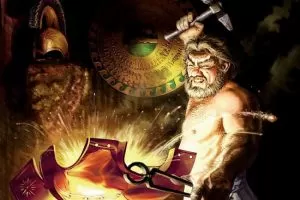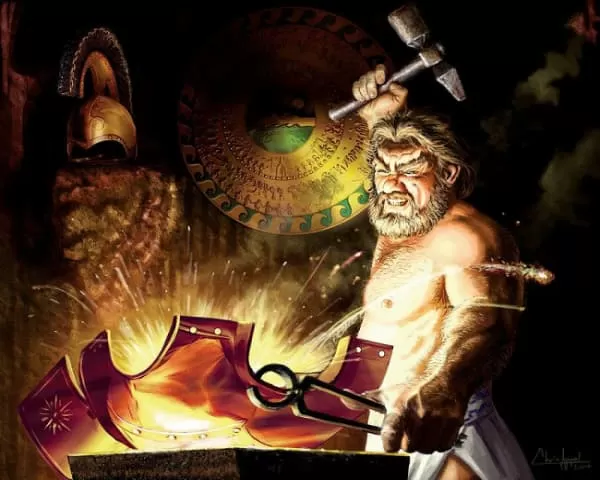Hephaestus in the mythology was known as the Vulcan god and the myths of Hephaestus and Vulcan are very similar. There are many myths of Hephaestus,
The ugly Greek god who used volcanoes as a forge, forging the rays of Jupiter.
Hephaestus should be the son of Zeus and Hera, but apparently it was only the fruit of his mother by parthenogenesis. Hera, jealous that Zeus would have had a daughter without his help, -The goddess Athena, who was born of her father’s head, decided to have a son without her husband, and this was Hephaestus.
The god was born ugly, screaming and deformed. His mother tried to hide him from the other Olympic gods, but finally, so that she wouldn’t be ashamed, she threw him from Olympus to Earth. It took him 9 days and 9 nights to arrive and due to the fall he added lameness to his misfortunes. He landed on the island of Lemnos and there was picked up by sailors Thetis and Eurynome who raised him and taught him the art of blacksmithing.
As he grew older, he sent his mother a gold throne made by him. It was revenge. When Hera sat down, it was impossible for her to get up and she was trapped in the royal seat. Only after the supplications of the other gods, did Hephaestus return to Olympus and set her free.
Myth of Hephaestus and Aphrodite
- Hephaestus and Aphrodite are a couple in the Olympic pantheon. According to one of the versions of the myth of Hespheus and Aphrodite, Zeus granted her as a wife in exchange for her freeing her mother Hera from the trap-trap in which she had been trapped.
- Other versions of the myth of the birth of Hephaestus do so before that of his sister Athena and Aphrodite would be the reward for having opened the head of Zeus, who had a great headache, and that brain cut arose the goddess.
- The myth of Hephaestus and Aphrodite leads us directly to the following: the myth of Hephaestus and Athena.
Myth of Hephaestus and Athena
- The myth of Hephaestus and Athena begins when he is betrayed again by his wife who runs away with Ares.
- The myth tells that the god of the forge was so frustrated that when his sister Athena went to la fragua to look for a new weapon, Hephaestus tried to rape her. Athena turned away and rejected him energetically so that Hephaestus’ semen fell on her leg.
- The goddess dried herself with a piece of wool that fell to the ground. The semen impregnated Gaia, the primeval mother goddess who personifies the earth, as a result of which she gave birth to Erictonius, half human and half snake.
Myth of Hephaestus, Prometheus and Pandora
- Hephaestus was the creator among other things of two automatons of human likeness that served him and also of the first human woman: Pandora.
- Prometheus had stolen the fire from the forge of Hephaestus (or from Helios’ chariot in other versions) in order to give it to humans. Zeus wanted to punish him for this fact and other actions in favor of men and ordered Hephaestus to make a woman out of clay.
- He sent her with an amphora to conquer Prometheus, but he suspected the girl who eventually married Epimetheus and liberated the evils of the world.
- Angrily Zeus captured Prometheus and forced Hephaestus to forge the chains that were to bind him to the rock in eternal torment.
- In spite of his unfortunate marriage to Aphrodite, Hephaestus had numerous offspring, both mortal and immortal.
- His children are the goddesses Euclea, Eufema, Eutenea and Philofrósine, who had married the youngest of the Caryatids. Also the aforementioned Erictonius, the nymph Talia or Cacus, the lazy giant who killed Heracles.
Related Topics
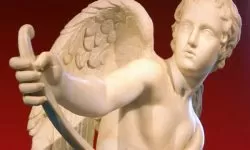
EROS GOD: Meaning, Mythology, Facts and Attributes
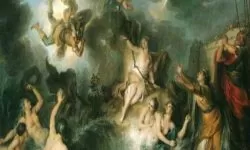
NAMES OF GREEK GODS: Apollo, Ares, Cronos, Dionysus

ARTEMIS GODDESS: Characteristics, Powers and History
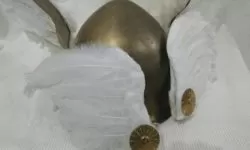
WHO IS THE GOD HERMES ?
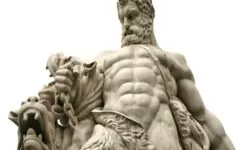
HERACLES GOD: Meaning, Powers and Attributes
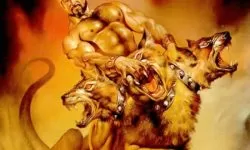
Who is Hercules in Mythology ? Son of Zeus and Alcmene
Studies of Other Mythological Gods in ALPHAPEDIA
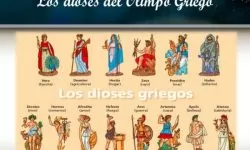
OLIMPUS GODS: ¿ Who Are ? ¿ What Are ? Names and Powers

NORSE GODS: Names, Meaning, Powers and History
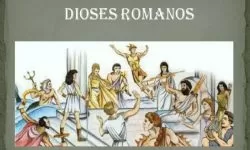
ROMAN GODS: Names, Meanings and Characteristics
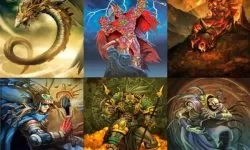
AZTEC GODS: List of Names, Meanings and Powers

THE GODDESSES OF MYTHOLOGY: Their Names and Meanings
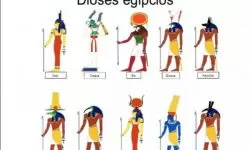
EGYPTIAN GODS: Their Names and Meanings
Other Topics of Interest in ALPHAPEDIA

FREE DOCTORATE IN TEACHING

TEZCATLIPOCA AZTEC GOD: Meaning, Attributes and Powers of Attorney

FREE CERTIFICATE PROGRAM IN FAMILY MEDIATION

FREE DOCTORATE IN BIOCHEMISTRY

BUY A CELL PHONE

FREE BACHELOR DEGREE IN FINANCE
HEPHAESTUS MYTHS IMAGE
